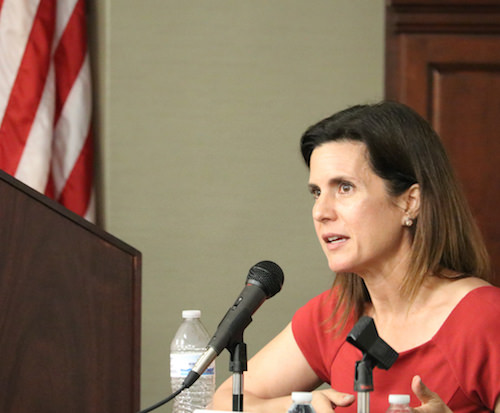In a mental health crisis, people are more likely to encounter police than get medical help, according to the National Alliance on Mental Health. As a result, more than 2 million people with mental illness are booked into jails each year, and the vast majority of these individuals are not violent criminals.
“They get arrested instead of getting into treatment,” said Dr. Marisa Giggie, associate professor of psychiatry and behavioral medicine at the College of Community Health Sciences and chief psychiatrist for the Tuscaloosa County Jail.
“The correctional system becomes the safety net.”
Once in jail, however, these individuals might not receive the treatment they need and might end up getting worse.
The College hosted a presentation and panel discussion April 25 to bring attention to the mental health crisis in jails. “Mental Health in Correctional Settings in Tuscaloosa” was held at DCH Regional Medical Center in Tuscaloosa. In addition to Giggie, presenters included Tuscaloosa County Sheriff Ron Abernathy and the Honorable M. Bradley Almond, presiding judge of Tuscaloosa’s Mental Health Court.
Giggie provided stark statistics about the mental health crisis in jails. She said there are 10 times more people with mental illness in jail than in state-funded mental health facilities. She said 30 percent of the 9 million inmates in Cook County Jail in Chicago have mental illnesses making the jail “the largest provider of mental health services in the country.”
Giggie said the mental illness inmates experience can include drug addiction, depression, Bipolar disorder, schizophrenia and post-traumatic stress disorder. She said confinement to jail cells can increase the symptoms of these inmates.
She sees approximately 30 percent of the total Tuscaloosa County Jail population, a daily average of 536 inmates, for a variety of mental health issues.
The issue of mental illness among offenders in the criminal justice system is not new, but now there is better information about the scope of the issue. The rise in inmates with mental disorders began decades ago when policies were enacted nationwide that moved mentally ill people out of state institutions in an attempt to allow them to return to their families and live independently.
To try to deal with the influx of mentally ill inmates, Tuscaloosa County, in 2012, implemented a mental health court that was established by Almond, Abernathy and Indian Rivers Mental Health Facility in Tuscaloosa. The Tuscaloosa County Mental Health Court is a jail diversion program for nonviolent mentally ill offenders.
Almond said to date, a total of 440 inmates have been assessed by the mental health court and of those, 140 have received mental health treatment and 81 have graduated, averting jail time.
“The last place a person with mental illness needs to be at is the county jail,” Abernathy said.
He and Almond estimate the mental health court keeps 30 to 40 inmates out of the system annually. “That’s saved us hundreds of thousands of dollars, but the most important issue is that these people don’t need to be there,” Abernathy said.
A jail diversion program for the mentally ill in Massachusetts has saved that state $1.3 million in health services costs, Giggie said. “A jail diversion program is less costly and more humane.”
In addition to Giggie, the Tuscaloosa County Jail also employs a full-time social worker and recently hired a health officer with the authority to seek mental health care for an individual rather than making an arrest.
